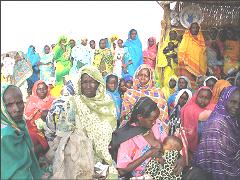Darfur refugees say will resist move to new camps
By Opheera McDoom
KALMA CAMP, Sudan, Nov 28 (Reuters) – Attempts by Sudanese authorities to relocate thousands of people from overflowing camps in Darfur are likely to run into problems as the refugees, distrustful of Khartoum’s motives, refuse to move.

|
|
A displaced Sudanese woman at Kalma camp, located about 20 km outside Nyala. |
More than 1.6 million people have been made homeless by the conflict that erupted between Darfur rebels and the Khartoum government in February 2003, and in Kalma Camp alone there are more than 100,000 refugees.
Aid agencies say the number is swelling, with up to 2,500 new refugees arriving in the overcrowded camp in Sudan’s remote, arid west every week, contributing to what the United Nations calls the world’s worst humanitarian crisis.
Standing among a crowd of agitated Darfuris, Sheikh Ali Ibrahim vowed he would never leave Kalma — located about 20 km (12 miles) outside Nyala, the main town in South Darfur state — despite government plans to relieve pressure there by relocating thousands of refugees to purpose-built camps.
The refugees distrust the government and blame them for the campaign of terror by Janjaweed Arab militia, whose looting and burning of African villages has forced thousands into the camps. The government admits arming some militia to fight the rebels but denies any links to the Janjaweed, calling them outlaws.
“We will not go anywhere,” Ibrahim shouted angrily, waving his hands. “Even if the United Nations comes to get us, we will only let them take us somewhere outside Sudan — nowhere else,” he declared, with dozens of African Fur tribal men nodding in agreement.
In November, military police surrounded three camps in South Darfur to move refugees to purpose-built camps away from Nyala. When many refugees refused to go, witnesses said the police used tear gas and beat people.
Adam Idriss al-Silek, deputy governor of South Darfur, told Reuters he intended to move people from Kalma and two other camps near Nyala to more suitable sites, but this time it would be done in coordination with aid agencies to avoid any violence.
But Eissa Ahmed Adam may take some convincing. He fled to Kalma after government forces bombarded his home town and Janjaweed militia attacked, killing more than 1,000 men and boys.
“I’m not going home, or anywhere else. I get oil, food, water here, and they will come and kill me anywhere else,” said Adam, 41.
“They” are the Janjaweed, a term loosely derived from the Arabic for devils on horseback and much misconceived in remote Darfur, where it has taken on the meaning of the unidentifiable bogeyman, blamed for every mishap.
REBELS ATTACK
Aid workers say Kalma is tense, with police sometimes surrounding the camp and denying them access.
Silek said a rebel attack last week that killed four Kalma policemen came from within the camp. One of the rebels killed in the attack had been registered there, he added.
The refugees deny any rebel presence in the camp and said the police had an internal squabble which left five civilians and four policemen dead.
“The police, they killed themselves — there are no opposition forces here and we have no links with these people,” said refugee al-Tahir Yagoub.
But a U.N. security source said it was almost certain that rebels were responsible and that they launched the attack from within the camp.
“The bodies of the attackers were found in between the camp and the police base,” he said, adding that most camp residents were from the Fur tribe, one of the worst hit by the violence and most of whom sympathise with the rebels.
After years of skirmishes between Arab nomads and mostly non-Arab farmers over scarce resources in Darfur, rebels took up arms, accusing the government of neglect.
